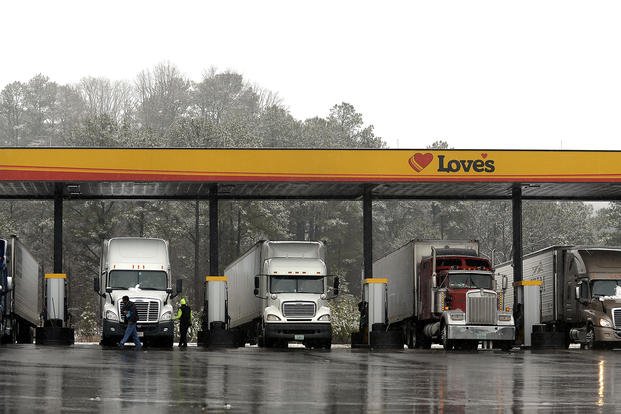While women have held support jobs in transportation and warehousing for decades, many careers in these fields have been so male-dominated that they don’t occur to women. “Schools and society don’t move women toward those jobs,” said Deborah Cutler-Ortiz, director of national programs and policy for Wider Opportunities for Women.
Nontraditional occupations for women in transportation and warehousing include road repair, mechanic, forklift operator, warehouse supervisor, logistics manager and drivers. And the pay can be good. Learn about the options and how to get moving on a career that could be right for you.
Get Trucking
In 1965, Dora Colvin climbed into her husband’s truck and realized it was similar to one she drove on her family’s North Dakota farm when she was 14. She has been a driver ever since, beginning with short-haul trucking when her children were still at home and then long-haul trucking with her husband for the past 14 years.
When Colvin began, a height requirement excluded many women, and she was frequently pulled over by patrolmen, who assumed she was unlicensed. Colvin remedied both situations by wearing cowboy boots and driving at night.
Times have changed. “It’s still a man’s world to a large degree, but there are many women out there,” said Colvin, whose career has progressed from oddity to 2005 Truckload Carriers Association Driver of the Year.
Though pay and benefits vary by company, women are finding that trucking earns a good salary and can provide benefits like health insurance and a 401(k) plan. Power steering, automatic transmissions and accessories to overcome physical limitations make trucks easier to handle.
Other creature comforts also have improved. Colvin’s truck is equipped with a microwave, TV, DVD, refrigerator and bunk beds. “Life is so much easier on the road now,” she said.
No Longer Lonely at the Top
When Leslie Ajlouny, vice president of business development for Evans Distribution Systems, talks about her company’s breadth of products and the business opportunities involved in moving and storing, you’d think she’s describing an exotic bazaar: “If you go through our company, you’ll see so much going on," Ajlouny said. "Such diversity and challenge.”
From forklift drivers to senior logistics managers, warehousing is a test of timing and spatial skills. “Our customers want to focus on the front end of their business, marketing, sales, R&D [research and development],” Ajlouny said. “Our business is to try to understand their business to get [their goods] to the right place at the right time in the right condition.” That means streamlining production, transportation and storage, as well as human and mechanical resources at every level.
And salaries are competitive. Forklift drivers make $11 an hour, and vice presidents of logistics take home a little under $175,000, according to Bob Shaunessy of the Warehousing Education and Research Council (WERC).
Women are increasingly a big part of warehousing. When Ajlouny started attending conferences for the Council of Supply Chain Management Professionals two decades ago, she estimated the ratio of male-to-female attendees was about 19-1. The numbers have changed dramatically since then, which Ajlouny believes encourages more women to come on board. “Women are succeeding in this,” she said.
Explore Transportation and Warehousing
How do you get into these jobs? Veterans and experts suggest these tips:
• Do your homework: Look at the details on jobs in transportation and warehousing at the Bureau of Labor Statistics. The WERC publishes a salaries and benefits guide for a variety of warehousing careers for $150. Get a peek at it by viewing this article in Multichannel Merchant.
• Go state: Lib Jameson, executive director of WOMEN Unlimited, encourages women to investigate state initiatives set up to recruit and train women for nontraditional occupations. Start by calling your state’s Department of Labor.
• Contact industry organizations: Wider Opportunities for Women, Women Unlimited and others can help direct you to the best opportunities.
• Get schooled: If you’re interested in executive work, take courses or get a degree in logistics, supply chain management or purchasing.
• Network: Join professional organizations like WERC or the Truckload Carriers Association.
• Shop for the best opportunity: Look for jobs that are unionized and companies that show a commitment to working with women. According to Colvin and Ajlouny, salaries and benefits vary widely from company to company, but benefits and good pay are definitely available.
Want to Know More About the Military?
Be sure to get the latest news about the U.S. military, as well as critical info about how to join and all the benefits of service. Subscribe to Military.com and receive customized updates delivered straight to your inbox.











